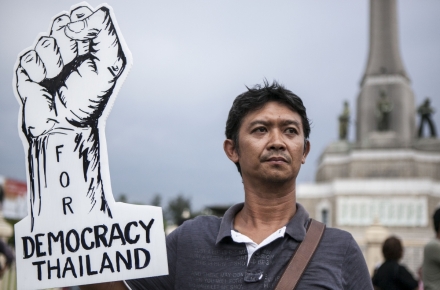Another chapter in Thailand’s tale of woe
Thailand is fast becoming a cautionary tale for the rest of Asia, says a leading expert from the ANU College of Asia and the Pacific.
It’s a story that could also end in bloodshed and civil war.
Writing for the next edition of East Asia Forum Quarterly Dr Nicholas Farrelly says that with the announcement of a coup by General Prayuth Chan-ocha on 22 May 2014, the Southeast Asian nation has ended another brief “flirtation with representative democracy”.
“This 2014 coup brings numbing anxiety about the prospect of civil war: a dramatic descent into the abyss that could pit northerner against southerner, rural against urban,” says Farrelly.
“Talk of a regional schism, once the preserve of online ranters, has gone mainstream. The kingdom—a unitary state fortified by the principle of unity above all else—is dangerously divided.
“With unhelpful external conditions, or bad luck, Thailand could topple from its perch among the most successful societies in Asia.
“That prospect—one that would have seemed ludicrous merely a decade ago—now looms ominously for a country that has become comfortable with its positive international and regional standing.”
In Southeast Asia, Thailand plays an essential role as an economic and logistics hub, and has positioned itself as a leader in a region “where democracy has shallow roots,” notes Farrelly.
“But Thailand, after the coup, is faced with the chance that it will no longer have the respect of its peers.”
Reports from inside Thailand indicate that since last Thursday’s coup, the military’s National Council for Peace and Order has summoned more than 250 politicians, government officials, business people, activists and academics.
According to some experts, people refusing the summons could face prison terms of up to two years. In addition the military has announced that all crimes against the crown and state will be tried by military courts.
But it is not just the men with tanks and the guns who are leading Thailand down a dangerous path.
Farrelly apportions some of the responsibility to the Thai royal family, whose King Bhumibol Adulyadej has reigned for an unprecedented 68 years.
“At a time when the royal institution needed to unite the people, it has taken sides in an unbecoming battle for political dominance. It has not weathered these storms unscathed. Thailand’s most ardent democratic voices identify palace aides as their enemies.
“Republican attitudes, which were largely dormant since the 1980s, are re-emerging. And what was once a gentle, and private, rumble of dissent about the political role of the royals now takes on more extreme forms.”
Almost as disconcerting is the pervasive nature of elite interests in the country – on both sides of politics.
“Crucially, Thailand demonstrates that there can be serious repercussions when democratic elections generate a changing of the guard,” says Farrelly.
“The government of deposed former Prime Minister Thaksin Shinawatra, which held power from 2001 until the earlier coup of 2006, represented an uncomfortable challenge to the old order of royal, military and bureaucratic authority.
“Thaksin upset the self-appointed guardians of decency. He also threatened to comprehensively displace those he consistently defeated at the ballot box by interfering with specific career trajectories. The coup of 19 September 2006 was the response to his electoral success and the years since have witnessed the tough struggle to re-define Thai democracy.”
In the aftermath of the most recent coup, Thailand continues to grapple with its multi-faceted political conflicts and the lack of consensus about how to distribute political and economic power. Its people and the rest of the world wait to see how this latest chapter in a long, sad story will end.
Dr Nicholas Farrelly is a Southeast Asia specialist in the ANU College of Asia and the Pacific and co-founder of New Mandala, the leading academic blog for the discussion of Thai politics. The next edition of East Asia Forum Quarterly will be online 15 June 2014.







